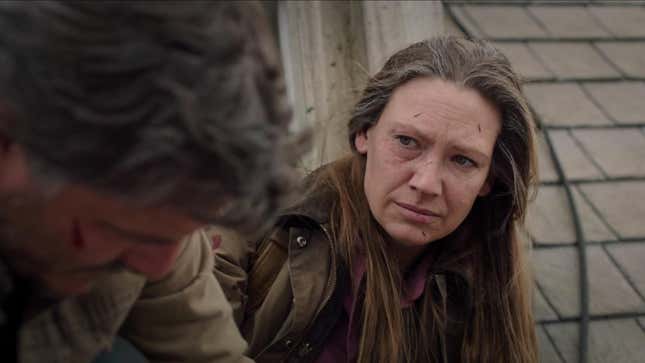
“You get her there. You keep her alive. And you set everything right. All the shit we did. Please say yes, Joel. Please.”
—Tess
Episode two of The Last of Us is here. Simply titled “Infected,” it follows Joel and Tess as they make their way to the capitol building in Boston to hand off Ellie to the Fireflies. If you’ve played the game, you know things don’t quite go as planned, and the same is true in the show, though there are many differences from the source material along the way. If you need to catch up, you can find last week’s recap here. Now let’s get into the new episode.
A lunch in Jakarta, interrupted
Like the premiere, this episode begins with a cold-open prologue. If the onscreen text informing us that we’re in Jakarta, Indonesia on September 24, 2003 sets your outbreak senses tingling, that’s because in last week’s episode, a fleeting radio bulletin mentioning Jakarta sparked a bit of discussion between Joel, Sarah, and Tommy over breakfast. Little heed was paid, however, to just what the substance of the story might have been. Here we learn that it was a bit of buried foreshadowing, and not just an excuse for Sarah to demonstrate her knowledge of global capitals.
At a cafe in Jakarta, people are enjoying their meals. There’s lively chatter, many a cigarette being smoked, and in the corner, a woman quietly eats her meal alone. It’s her the military officers who enter the restaurant are seeking, their presence bringing a hush over the crowd.
In the back of their car, the woman asks if she has committed a crime (“Of course not” comes the polite reply) and then wonders if perhaps there’s some mistake. “You are Ibu Ratna, professor of mycology, university of Indonesia,” he replies. “We have the right person.” It’s precisely her expertise in her niche field of study that has caused them to seek her out, it seems.
At a hospital, Ratna is taken behind locked doors and asked to examine a specimen. What she sees confuses her. She identifies it as ophiocordyceps, but notes that the sample was prepared using chlorazol, which is used for samples taken from humans. “Cordyceps cannot survive in humans,” she says. The officer escorting her nods knowingly and sadly, before taking her to see something else.
Not quite patient zero
In full protective gear, Ratna enters a chamber where a woman’s dead body lies on an examination table. A bullet hole is visible at the center of her forehead, and on her left ankle, a strange bite mark festers. The professor makes an incision, and within, a white material is secreted. She asks if the bite is from a human, and the officer nods. She moves on to probing the victim’s mouth, and pulls out several of the same creepy fungal strands we saw protruding from old Grandma Adler’s mouth in last week’s episode. When the strands twist on their own, she drops her tongs and flees, as the strands in the victim’s mouth continue to eerily emerge.
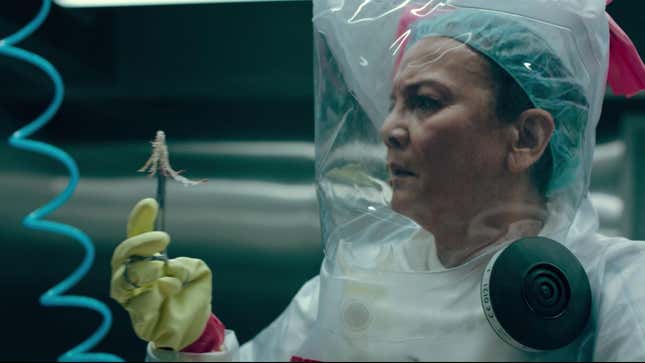
Moments later, in a comfortable waiting room, the officer tells Ratna that the incident that led to the woman’s death took place at a flour and grain factory. “A perfect substrate,” Ratna replies. I admit, I had to look up the term “substrate,” which Merriam-Webster defines as “the base on which an organism lives.” She bit three others, the officer tells her, all of whom were taken in for observation and subsequently executed as they became hostile themselves. However, the person who bit her remains unknown, out there somewhere, and meanwhile, 14 other workers at the factory are missing.
It’s at that moment that the danger and scope of the infection starts to become clear, and Ratna’s demeanor becomes increasingly hopeless. With the cold authority of someone who has spent her life studying these organisms, she informs the officer that there is no medicine, there is no vaccine. When he asks her what can be done, her answer is a single chilling word: “Bomb.” Perhaps if all of Jakarta is scorched to the ground and everyone in it obliterated, there may be some hope for the rest of humanity.
I have to say that the imagery of this week’s prologue sits a bit uncomfortably with me. Though the show will explain in a future episode that the outbreak didn’t originate in any one place, the image of a dead (but apparently still contagious and dangerous) Indonesian woman as the closest thing the show gives us to a patient zero, when so much xenophobia and anti-Asian racism has flared in recent years because of hateful, ignorant right-wing rhetoric about the spread of covid-19, is, at the very least, charged.
I’m glad that the show is making an effort to broaden our perspective on Outbreak Day beyond what the game gave us and to acknowledge that the rest of the world suffered as well. Indeed, I recognize that it may have been precisely a desire to expand the show’s lens beyond places and cultures dominated by whiteness that resulted in the writers choosing Jakarta in the first place. I think the actors in this brief sequence are outstanding, and that the show itself treats them with dignity.
But when our culture is already full of people who have made racist associations in their minds between deadly outbreaks and Asian people, and when we’re seeing the dangerous and deadly results of those associations in tragic news stories all the time, I think the image of the Asian woman as a specimen of the outbreak is troubling in all the wrong ways—for all the ways it may reinforce or incite further baseless, racist attitudes in the minds of already racist people—and so I wish they’d set this particular prologue in Paris or Athens or Sydney or any number of other places.
Ibu Ratna tearfully asks to be driven home so that she can be with her family at the end, and the opening credits begin.
Back to Boston
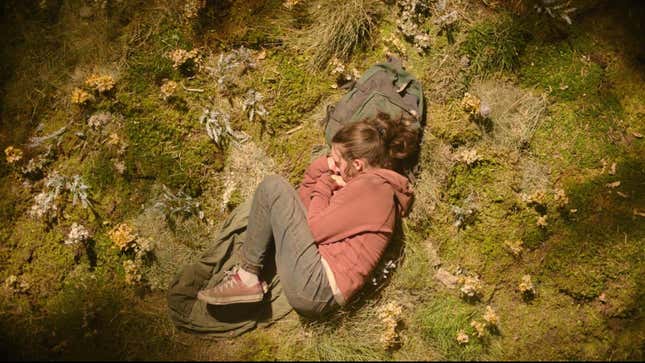
Post-credits, we open on the striking image of Ellie, sleeping curled up in a patch of grass, a butterfly fluttering overhead. (A moment later, the credits tell us that this episode was directed by Neil Druckmann himself.) When Ellie stirs, she finds herself being observed—very closely observed—by Joel and Tess, who interrogate her more about her wound while Joel holds a rifle at the ready. Joel, in one little moment of many throughout the series that establish this version of him as more fragile and vulnerable than the game’s, can’t quite steady his right hand, which he broke while savagely beating the FEDRA officer to death the night before. “Maybe a hairline,” he says stoically. “It’ll heal fast.”
Here, the show starts cultivating the divide between Joel and Tess over Ellie’s fate, something the game doesn’t really do until mere moments before Tess’ death. It’s already clear that Tess sees delivering Ellie as a more meaningful task than Joel does. His commitment to remaining detached and avoiding the pain that comes from loss is made bluntly plain when he says, “You need to stop talking about this kid like she’s got some kind of life in front of her.”
I also need to comment here on the excellence of Anna Torv, who is fully believable as the hardened and world-weary Tess. She brings remarkable depth to her fairly limited time onscreen, subtly conveying the conflicted internal shift of a person who, after years of drudgery and brutality, finally comes into contact with something that just might offer her life a larger sense of meaning.
Tess in charge of our days and our nights
The exchange also demonstrates, in its own way, something I think is crucial to the dynamic in the game’s early going: While Tess and Joel have something of a partnership, the balance of power and decision-making skews in Tess’ favor. It’s clear that Joel is very reluctant to press on, that he thinks they should turn back now and find another way to get the battery that will let them go looking for Tommy.
Replaying this section in the game, I was reminded how much the game makes Tess feel not only like the leader, but also like someone who’s absolutely essential to the group’s survival. At one point in this stretch of the game, Joel is tackled by a clicker, and it’s Tess who saves his life. It’s Tess who bluntly executes Robert back in the QZ, and who shoots the FEDRA officers who stop them just outside of it. She’s the dynamic one, the one willing to immediately leap into action and do what needs to be done. As a result, when she dies, you feel like things are much more dire moving forward.
I don’t think the HBO show quite succeeds in making her seem so capable and necessary, but I did appreciate that it’s her who makes the decision here to continue on the journey, with Joel ultimately relenting. It’s reminiscent of an exchange that happens in the game, when Joel seems to be flagging as they approach the capitol building. Tess says, “We’re almost done. Stay focused.” Joel, with a bit of resentment, replies, “Yes ma’am.”
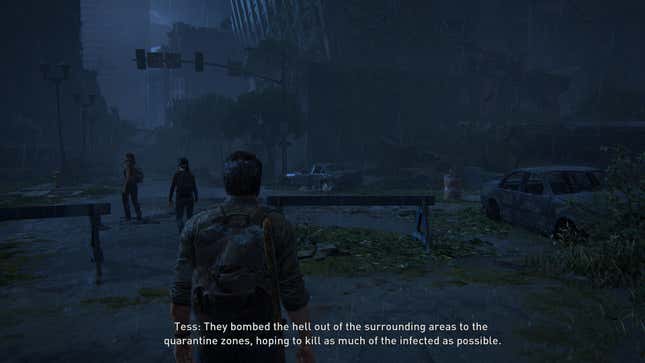
But back to the show. As they emerge into the daylight, there’s a haunting beauty to the wreckage of Boston, accentuated by a flock of white birds flying between the signature skyscrapers I talked about last week. And then, in a callback to the episode’s heartbreaking prologue, Ellie sees a bomb crater, and Tess explains that it was an effort to slow down the spread. “It worked here,” she says, “but it didn’t in most places.” RIP Ibu Ratna. Your desperate, self-sacrificing ploy may have saved a few lives, at least.
It’s roughly at this point in the game that your experience becomes one of tense stealth action, scrounging for supplies in drawers and picking off runners and clickers as you make your way through an office building and a subway tunnel on your way to the capitol. It puts the infected threat front and center. (With my rusty skills, I saw infected rip tendons from Joel’s neck with their jaws many, many times as I replayed this bit.) The show can’t devote nearly as much time to sneaky combat as the game can, but it still pits the trio against infected in its own way. For the moment the threat remains distant, an echoing shriek reminding the trio that the danger is out there, somewhere.
The hotel at the end of the world
The three head into a hotel, a nod to a location Joel and Ellie visit later in the game. It’s here, in the half-flooded lobby, that Ellie admits she can’t swim, though thankfully Joel doesn’t need to find a floating platform for her to ride on. “Seriously?” he says in response to her concerns before jumping in to reveal that it’s shallow enough for her to wade through.
A sweet moment follows as Ellie approaches the front desk, rings the bell, and says to nobody, “Yes, sir, I would like your finest suite, please.” How could a kid in her position not be constantly imagining the world she’ll never get to experience? As she pushes a luggage cart, a skeleton startles her and she falls back against the lobby’s piano. Joel offers her his hand to help her up, and afterward, he looks at it, almost as if he’s worried about getting infected from her, though I think what he’s more concerned about is letting himself feel any attachment to her.
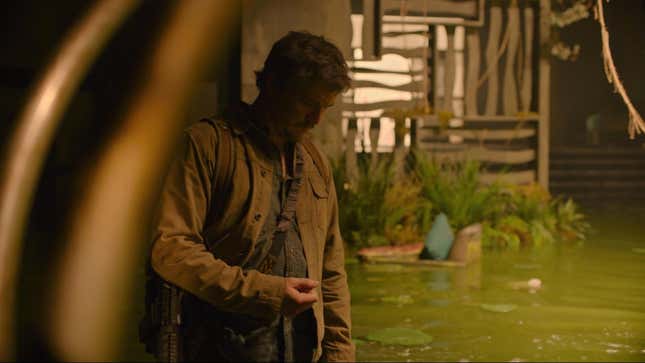
But attachment is, of course, precisely what the show has in mind. Tess scouts ahead and leaves Joel and Ellie alone for a bit, giving them an opportunity to awkwardly learn a bit about each other. Ellie asks Joel where he’s from, in a way that says “I know this is the most basic, obvious ‘getting-to-know-you’ question in the world.” He volunteers that he’s from Texas and Tess is from Detroit. When Ellie asks more personal questions, though, such as ”So are you two, like, uhh…?” his response is an emphatic “Pass.”
However, she manages to get a little more out of him when she asks if he’s ever killed an infected. He admits he’s killed many, and she asks if “knowing they were people once” makes it hard. “Sometimes,” he says. It’s a disturbing train of thought I don’t recall the game ever exploring: whether, deep within a cordyceps host, some part of the person they once were still exists, some shred of awareness, agonized and horrified by what they’ve become.
Moments later, Tess and Joel take Ellie out onto a rooftop, from which a writhing crowd of infected can be seen far below, and here the show introduces another idea about its infected that I don’t recall from the game. Noticing synchronized movements among the group, Ellie says “They’re connected.” Tess explains, “The fungus also grows underground. Long fibers like wires, some of them stretching over a mile. You step on a patch of cordyceps in one place, and you can wake a dozen infected somewhere else. Now they know where you are, now they come. You’re not immune from being ripped apart.” It’s a bit of exposition that sure seems like it’s precisely designed to set up a dangerous situation later, doesn’t it?
A meeting at the museum
The route they’d intended to take blocked by the mob of infected, they must go another way, one also fraught with risk. “Museum,” Joel says, indicating their only path forward now, and as they approach this building dedicated to the city’s history (the Bostonian Museum, which as far as I can tell is a fictional institution), we see an unusual sight: the structure itself is covered in fungal growth. Joel notes that the fungus outside the building’s entrance is “bone dry,” which “could mean they’re all finally dead in there.” Before heading in, Tess retrieves a flashlight and pistol from her backpack, and the way she holds them, using her flashlight arm to support her pistol arm, shows these two are seasoned pros at this.
It’s soon clear that despite the dry fungus outside, the museum isn’t safe, as Ellie finds a freshly ravaged body in a corner. Joel demands total silence as they press forward. The creaky old building doesn’t exactly cooperate, however, making noise as they climb the musty, overgrown stairwell. Their movement triggers a ceiling collapse behind them, and they find themselves in a room with early American memorabilia and a prowling clicker.
It’s a tense encounter, as the infected stands very close to the three of them on the other side of a display case, visible through the glass. “They can’t see but they can hear,” Joel silently communicates to Ellie before urging her to not make a sound. Ellie tries to stay quiet but, her heart racing, she loudly exhales upon seeing the clicker’s face and that’s enough. The creature turns toward them and Joel immediately opens fire, grappling with it while urging Tess and Ellie to run as another clicker emerges and gives chase.
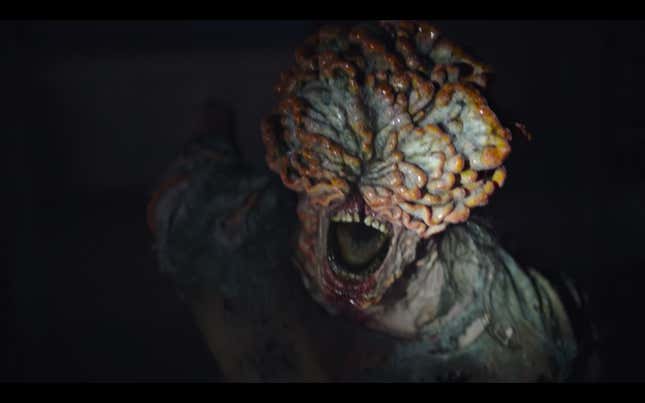
Chaos ensues, and Joel manages to distract one of the clickers with the sound of breaking glass by pushing a bust of Benjamin Franklin into another display case (see, there are reasons to keep statues of the Founding Fathers around). Following a tense attempt to silently reload a gun, a bit of quiet sneaking, Joel accidentally stepping on glass and alerting a clicker, Tess plunging an axe into one’s head, and many bullets being fired, both clickers finally lay dead. The encounter captures, about as effectively as a filmed sequence can, the nail-biting and borderline exhausting tension that fights with infected in the game sometimes have, and the actors playing the clickers lend their movements a captivating strangeness that makes them seem simultaneously human and inhuman.
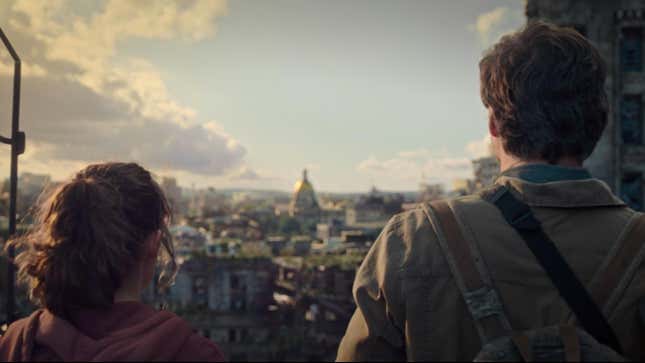
In the aftermath, Ellie reveals that she was bitten again. “I mean, if it was gonna happen to one of us…” she says. Tess gives a significant look but says nothing, though it’s clear she has something on her mind. As Joel attends to her sprained ankle, Tess looks at him with rare appreciation and tenderness, almost as if she’s making a conscious effort to appreciate his presence and the goodness in him. But when he starts to voice concerns about Ellie getting bitten a second time, she quickly gets fed up and snaps at him. “How ‘bout you just take the good news? Can you do that? Like to think for once we could actually win?”
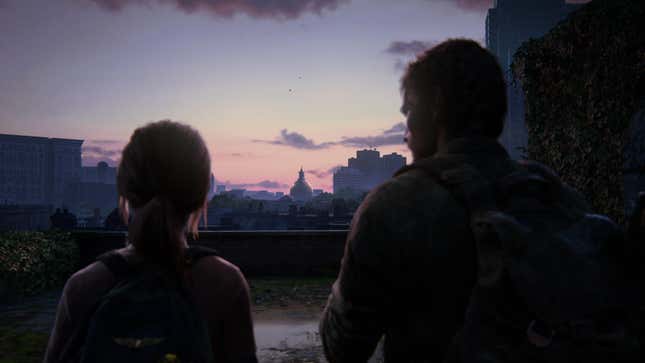
She sends him off to join Ellie, and the two have an exchange that’s lifted straight from the game. As Ellie looks toward the golden dome of the capitol, Joel asks her if it’s everything she hoped for. “The jury’s still out,” she says, “but man, you can’t deny that view.” The moment doesn’t last long, though, as Tess seems in a hurry to reach the rendezvous point. Joel glances almost imperceptibly at his watch, and it makes me wonder what he’s thinking and feeling. Does the prospect of feeling any attachment to a young person today feel to him like a betrayal of Sarah’s memory?
Tess’ final plea
Outside the capitol building, save for one corpse, there’s no sign of the Fireflies they were supposed to rendezvous with, and inside, just as in the game, Joel and Tess find the contingent dead. Also as in the game, things come to a head between Tess and Joel, with him seeing this as the end of their journey and her unwilling to turn back.
As she looks for a map or something else that may help them on their way, searching a corpse that I think may be episode director Neil Druckmann in a sly cameo, he protests that now is the time for them to go home. “That’s not my fucking home!” she angrily retorts, before saying that she’s staying and that their luck had to run out sooner or later. Ellie realizes that Tess is saying she’s infected, and Tess shows Joel the nasty wound on her shoulder that she must have gotten back at the museum.
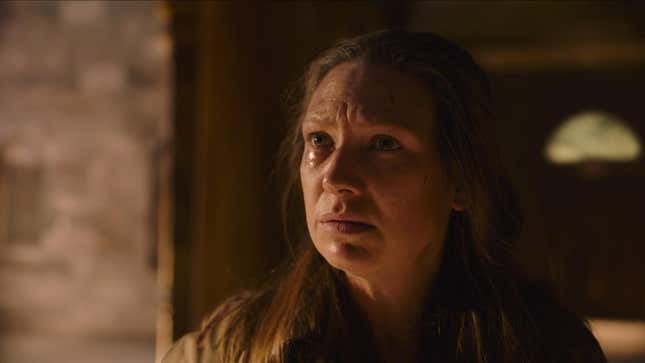
There’s no denying now that their time together is quickly coming to a close. In the game, this is where seeking out Tommy first gets mentioned as a possible goal. Tess tells Joel that Tommy, as a former Firefly, can surely help Joel find the Firefly base out west, wherever it might be. In the show, however, it’s Bill and Frank’s place that Tess urges Joel to get to. She knows Joel just wants out, so she wants to make it as easy for him as possible while still ensuring that Ellie gets where she needs to go. “They’ll take her off your hands and they’ll handle it from here.” Joel says he can’t, and in a painful line that reveals volumes about their relationship, Tess says, “I never ask you for anything, not to feel the way I felt, not to—you shut the fuck up because I don’t have time!—this is your chance. You get her there. You keep her alive. And you set everything right. All the shit we did. Please say yes, Joel. Please.”
In the game it all unfolds much more quickly, and the only voicing of whatever feelings may have existed between the two of them comes when Tess says, “Look, there’s enough here that you have to feel some obligation to me so you get her to Tommy’s.” In the show, Tess saying that she never asked Joel to “feel the way I felt” reveals a history in which she wanted more, wanted things to be different, but at a certain point just accepted that he wasn’t emotionally available, at least not to her, not in the way she wanted him to be. And now, he owes her for all the time she gave him. This is their shot at some kind of redemption for all the bad things they’ve done. (In the game, this sentiment comes through in Tess’ line, “We’re shitty people, Joel. It’s been that way for a long time.”)
Again, it’s remarkable work from Anna Torv, who seems to draw on a life filled with shame and disappointment as she pleads with the only person she has any real connection with to do something in her memory that matters. Tess will soon be gone, but in the show I feel the emotional weight of her plea echoing in Joel’s actions in the events that follow in a way I never quite did in the game.
Save who you can save
An infected gasps and lurches, Joel kills it, and hey, remember that bit earlier about the infected sometimes being connected across long distances? Well, the fungal tendril hivemind alerts the mob we saw earlier from the roof of the hotel, and they begin charging en masse for the capitol. In the game, the threat here is FEDRA officers storming the building, but by that point in the game, you’ve already had several tense encounters with infected, so the danger is well established. I suspect the show shifted to infected here to continue emphasizing just how potent a threat they are. And while the game’s Tess is unceremoniously killed in a gunfight, the show’s setup allows her to go out in a literal blaze of glory and take an entire mob of infected with her.
Tess spills gasoline and scatters grenades all over the foyer. “Save who you can save,” she says to Joel, her final words to him, before he drags Ellie off as the teen protests. As the Left 4 Dead-style zombie horde storms the gates and charges in, Tess flicks her lighter, preparing to set the whole place alight.
And then comes perhaps the strangest and most unexpected image in the entire HBO adaptation. One infected approaches her, almost hesitantly, perhaps sensing that she’s infected too and thus seeing her not as a target but as a member of the collective. Its mouth open, those creepy fungal tendrils protruding, it kisses Tess, and the tendrils go into her mouth and presumably down her throat.
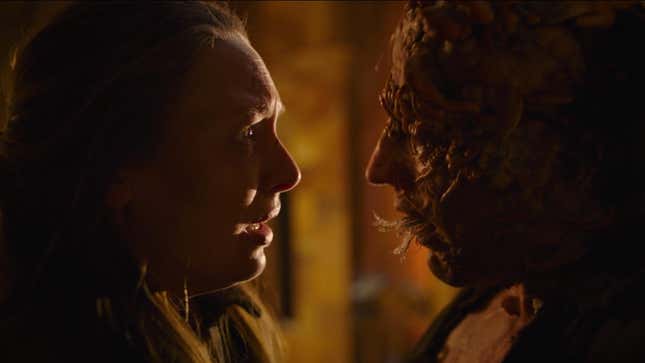
It’s a complicated image to me, potent in some ways and troubling in others. It recalls the conversation Joel and Ellie had earlier about the disturbing notion that there may still be something human lingering in the mind of an infected. Does an infected yearn? I think Tess yearns, and I think there’s something deeply sad about the thought that, for all those years, she may have gotten sex from Joel but she clearly never got the emotional connection she yearned for. The only image of anything resembling affection that we see in her life is this twisted, nightmare version of it, one that comes bringing death.
Thematically, this episode is particularly focused on connection, juxtaposing the unifying, hivemind bond that connects the infected mob with the flawed, insufficient connections in the lives of its human characters, particularly the deeply guarded Joel, and Tess, who wanted more from him. As an episode of TV, these thematic concerns lend it a compelling internal texture that makes it stronger. At the same time I’m frustrated with the idea that Tess, who in the game is a woman of action right up until her final moments, here fearfully fumbles with her lighter and rather passively stands and lets herself be kissed by the infected in the end. I think the show could have made this version of her more human and vulnerable than the game’s Tess while still giving her a death that was strong and active.
Tess’ lighter falls to the floor, igniting an explosion that engulfs the building’s ground floor in flames. Joel and Ellie watch it burn. Joel presses on and Ellie stands there for a time, overwhelmed, perhaps, by the fact that someone else has just given their life to protect hers.
Odds and ends
Before I sign off, here are a few other quick thoughts I had and details I wanted to mention about the episode and the equivalent stretch of the game:
Ellie’s a bit of a jokester. At one point, Joel says “If she so much as twitches,...” which prompts Ellie to do her best “I’m turning into a monster!” twitch. Joel is not amused. Will Ellie crack Joel’s hardened exterior with her sense of humor eventually?
In this section of the game, as you make your way through the wreckage of the leaning office building, Joel and Tess have a short conversation about taking it easy for a bit after delivering Ellie to the rendezvous point. Here, perhaps in an inverse of the emotional dynamic between them in the show, Joel says that Tess always brushes him off when he suggests they lay low. “Well, I won’t this time,” she says, as if she’s warming up to the idea of just being with Joel for a while. Sadly, not unlike a cop who announces he’s two weeks from retirement just before he gets killed in a movie, you know this potentially pleasant future for the two of them will never come to pass.
In both the game and the show, Tess asks Ellie how she got bit, and she says she snuck into the mall, where she was attacked by an infected. In the game, Tess asks if she was with Marlene when it happened, and she says no, she went to Marlene for help afterward. In the show, Tess asks if she was at the mall alone. Ellie hesitates conspicuously for a moment before saying yes, she was alone. Those who have played The Last of Us: Left Behind know why.
What did you think of this week’s episode? Were there any parallels or diversions between the show and the game you found particularly interesting or frustrating? Let us know in the comments below, and brace yourselves. As the sneak peek for episode three on HBO Max reveals, Bill and Frank are on the horizon, and that one’s a doozy. See you next week.
The Last of Us airs Sundays at 9 p.m. ET on HBO and HBO Max.